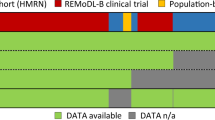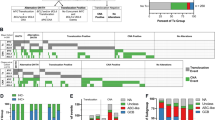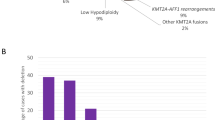Abstract
Recently, centrosome aberrations have been described as a possible cause of aneuploidy in many solid tumors. To investigate whether centrosome aberrations occur in non-Hodgkin's lymphoma (NHL) and correlate with histologic subtype, karyotype, and other biological disease features, we examined 24 follicular lymphomas (FL), 18 diffuse large-B-cell lymphomas (DLCL), 33 mantle cell lymphomas (MCL), and 17 extranodal marginal zone B-cell lymphomas (MZBCL), using antibodies to centrosomal proteins. All 92 NHL displayed numerical and structural centrosome aberrations as compared to nonmalignant lymphoid tissue. Centrosome abnormalities were detectable in 32.3% of the cells in NHL, but in only 5.5% of lymphoid cells from 30 control individuals (P<0.0001). Indolent FL and MZBCL contained only 25.8 and 28.8% cells with abnormal centrosomes. In contrast, aggressive DLCL and MCL harbored centrosome aberrations in 41.8 and 35.0% of the cells, respectively (P<0.0001). Centrosomal aberrations correlated to lymphoma grade, mitotic, and proliferation indices, but not to the p53 labeling index. Importantly, diploid MCL contained 31.2% cells with abnormal centrosomes, while tetraploid samples harbored centrosome aberrations in 55.6% of the cells (P<0.0001). These results indicate that centrosome defects are common in NHL and suggest that they may contribute to the acquisition of chromosomal instability typically seen in NHL.
This is a preview of subscription content, access via your institution
Access options
Subscribe to this journal
Receive 12 print issues and online access
$259.00 per year
only $21.58 per issue
Buy this article
- Purchase on Springer Link
- Instant access to full article PDF
Prices may be subject to local taxes which are calculated during checkout



Similar content being viewed by others
References
Hartwell LH, Kastan MB . Cell cycle control and cancer. Science 1994; 266: 1821–1828.
Waters JC, Salmon E . Pathways of spindle assembly. Curr Opin Cell Biol 1997; 9: 43–73.
Nicklas RB . How cells get the right chromosomes. Science 1997; 275: 632–637.
Merdes A, Cleveland DW . Pathways of spindle pole formation: different mechanisms; conserved components. J Cell Biol 1997; 138: 953–956.
Meraldi P, Lukas J, Fry AM, Bartek J, Nigg EA . Centrosome duplication in mammalian somatic cells requires E2F and Cdk2-cyclin A. Nat Cell Biol 1999; 1: 88–93.
Hinchcliffe EH, Li C, Thompson EA, Maller JL, Sluder G . Requirement of Cdk2-cyclin E activity for repeated centrosome reproduction in Xenopus egg extracts. Science 1999; 283: 851–854.
Lacey KR, Jackson PK, Stearns T . Cyclin-dependent kinase control of centrosome duplication. Proc Nat Acad Sci USA 1999; 96: 2817–2822.
Krämer A, Neben K, Ho AD . Centrosome replication, genomic instability and cancer. Leukemia 2002; 16: 767–775.
Lengauer C, Kinzler KW, Vogelstein B . Genetic instability in colorectal cancers. Nature 1997; 386: 623–627.
Carroll PE, Okuda M, Horn HF, Biddinger P, Stambrook PJ, Gleich LL et al. Centrosome hyperamplification in human cancer: chromosome instability induced by p53 mutation and/or Mdm2 overexpression. Oncogene 1999; 18: 1935–1944.
Zhou H, Kuang J, Zhong L, Kuo WL, Gray JW, Sahin A et al. Tumor amplified kinase STK15/BTAK induces centrosome amplification, aneuploidy and transformation. Nat Genet 1998; 20: 189–193.
Marx J . Do centrosome abnormalities lead to cancer? Science 2001; 292: 426–429.
Pihan GA, Purohit A, Wallace J, Malhotra R, Liotta L, Doxsey SJ . Centrosome defects and genetic instability in malignant tumors. Cancer Res 1998; 58: 3974–3985.
Duensing S, Lee LY, Duensing A, Basile J, Piboonniyom S, Gonzalez S et al. The human papillomavirus type 16 E6 and E7 oncoproteins cooperate to induce mitotic defects and genomic instability by uncoupling centrosome duplication from the cell division cycle. Proc Natl Acad Sci USA 2000; 97: 10002–10007.
Mailand N, Lukas C, Kaiser BK, Jackson PK, Bartek J, Lukas J . Deregulated human Cdc14A phosphatase disrupts centrosome separation and chromosome segregation. Nat Cell Biol 2002; 4: 317–322.
Weber RG, Bridger JM, Benner A, Weisenberger D, Ehemann V, Reifenberger G et al. Centrosome amplification as a possible mechanism for numerical chromosome aberrations in cerebral primitive neuroectodermal tumors with TP53 mutations. Cytogenet Cell Genet 1998; 83: 266–269.
Lingle WL, Lutz WH, Ingle JN, Maihle NJ, Salisbury JL . Centrosome hypertrophy in human breast tumors: implications for genomic stability and cell polarity. Proc Natl Acad Sci USA 1998; 95: 2950–2955.
Lingle WL, Salisbury JL . Altered centrosome structure is associated with abnormal mitoses in human breast tumors. Am J Pathol 1999; 155: 1941–1951.
Sato N, Mizumoto K, Nakamura M, Nakamura K, Kusumoto M, Niiyama H et al. Centrosome abnormalities in pancreatic ductal carcinoma. Clin Cancer Res 1999; 5: 963–970.
Kuo K-K, Sato N, Mizumoto K, Maehara N, Yonemasu H, Ker CG et al. Centrosome abnormalities in human carcinomas of the gallbladder and intrahepatic and extrahepatic bile ducts. Hepatology 2000; 31: 59–64.
Gustafson LM, Gleich LL, Fukasawa K, Chadwell J, Miller MA, Stambrook PJ et al. Centrosome hyperamplification in head and neck squamous carcinoma: a potential phenotypic marker of tumor aggressiveness. Laryngoscope 2000; 110: 1798–1801.
Schneeweiss A, Sinn H-P, Ehemann V, Khbeis T, Neben K, Krause U et al. Centrosome aberrations in primary invasive breast cancer are associated with nodal status and hormone receptor expression. Int J Cancer 2003; Pulished online: 21 August 2003.
Neben K, Giesecke C, Schweizer S, Ho AD, Krämer A . Centrosome aberrations in acute myeloid leukemia are correlated with cytogenetic risk profile. Blood 2003; 101: 289–291.
Johansson B, Mertens F, Mitelman F . Cytogenetic evolution patterns in non-Hodgkin's lymphoma. Blood 1995; 86: 3905–3914.
Bloomfield CD, Arthur DC, Frizzera G, Levine EG, Peterson BA, Gajl-Peczalska KJ . Nonrandom chromosome abnormalities in lymphoma. Cancer Res 1983; 43: 2975–2984.
Ott G, Kalla J, Ott MM, Schryen B, Katzenberger T, Müller JG et al. Blastoid variants of mantle cell lymphoma: frequent bcl-1 rearrangements at the major translocation cluster region and tetraploid chromosome clones. Blood 1997; 89: 1421–1429.
Tilly H, Rossi A, Stamatoullas A, Lenormand B, Bigorgne C, Kunlin A et al. Prognostic value of chromosome abnormalities in follicular lymphoma. Blood 1994; 84: 1043–1049.
Nathwani BN, Harris NL, Weisenburger D, Isaacson PJ, Piris MA, Berger F . Follicular lymphoma. In: Jaffe ES, Harris NL, Stein H, Vardiman JW (eds). Pathology and Genetics of Tumours of Haematopoietic and Lymphoid Tissues. Lyon: IARC Press, 2001 pp. 162–167.
Mitelman F (ed.). An International System for Human Cytogenetic Nomenclature. Freiburg: ISCN, Karger, 1995.
Gavanescu I, Vazquez-Abad D, McCauley J, Senecal JL, Doxsey S . Centrosome proteins: a major class of autoantigens in scleroderma. J Clin Immunol 1999; 19: 166–171.
Doxsey SJ, Stein P, Evans L, Calarco P, Kirschner M . Pericentrin, a highly conserved protein of centrosomes involved in microtubule organization. Cell 1994; 76: 639–650.
Harrell FE . Regression Modeling Strategies: with Applications to Linear Models, Logistic Regression, and Survival Analysis. Heidelberg: Springer, 2001.
Loeb LA . Mutator phenotype may be required for multistage carcinogenesis. Cancer Res 1991; 51: 3075–3079.
Lengauer C, Kinzler KW, Vogelstein B . Genetic instabilities in human cancers. Nature 1998; 396: 643–649.
Mitelman F, Johansson B, Mertens F . Catalogue of Chromosome Aberrations in Cancer Vol. 2 New York: Wiley-Liss, 1994.
Lingle WL, Barrett SL, Negron VC, D'Assoro AB, Boeneman K, Liu W et al. Centrosome amplification drives chromosomal instability in breast tumor development. Proc Natl Acad Sci USA 2002; 99: 1978–1983.
Pihan GA, Purohit A, Wallace J, Malhotra R, Liotta L, Doxsey SJ . Centrosome defects can account for cellular and genetic changes that characterize prostate cancer progression. Cancer Res 2001; 61: 2212–2219.
Shono M, Sato N, Mizumoto K, Maehara N, Nakamura M, Nagai E et al. Stepwise progression of centrosome defects associated with local tumor growth and metastatic process of human pancreatic carcinoma cells transplanted orthotopically into nude mice. Lab Invest 2001; 81: 945–952.
Greiner TC, Moynihan MJ, Chan WC, Lytle DM, Pedersen A, Anderson JR et al. p53 mutations in mantle cell lymphoma are associated with variant cytology and predict a poor prognosis. Blood 1996; 87: 4302–4310.
Pinyol M, Hernandez L, Cazorla M, Balbin M, Jares P, Fernandez PL et al. Deletions and loss of expression of p16INK4a and p21Waf1 genes are associated with aggressive variants of mantle cell lymphomas. Blood 1997; 89: 272–280.
Dreyling MH, Bullinger L, Ott G, Stilgenbauer S, Müller-Hermelink HK, Bentz M . Alterations of the cyclin D1/p16-RB pathway in mantle cell lymphoma. Cancer Res 1997; 57: 4608–4614.
Starostik P, Patzner J, Greiner A, Schwarz S, Kalla J, Ott G et al. Gastric marginal zone B-cell lymphomas of MALT type develop along 2 distinct pathogenetic pathways. Blood 2002; 99: 3–9.
Sánchez-Beato M, Sáez AI, Navaz IC, Algara P, Sol Mateo M, Villuendas R et al. Overall survival in aggressive B-cell lymphomas is dependent on the accumulation of alterations in p53, p16, and p27. Am J Pathol 2001; 159: 205–213.
Lo Coco F, Gaidano G, Loui DC, Offit K, Chaganti RSK, Dalla-Favera R . p53 mutations are associated with histologic transformation of follicular lymphoma. Blood 1993; 82: 2289–2295.
Shackney SE, Smith CA, Miller BW, Burholt DR, Murtha K, Giles HR et al. Model for the genetic evolution of human solid tumors. Cancer Res 1989; 49: 3344–3354.
Atkin NB . Chromosomal doubling: The significance of polyploidization in the development of human tumors: possibly relevant findings on a lymphoma. Cancer Genet Cytogenet 2000; 116: 81–83.
Korz C, Pscherer A, Benner A, Mertens D, Schaffner C, Leupolt E et al. Evidence for distinct pathomechanisms in B-cell chronic lymphocytic leukemia and mantle cell lymphoma by quantitative expression analysis of cell cycle and apoptosis-associated genes. Blood 2002; 99: 4554–4561.
Fukasawa K, Choi T, Kuriyama R, Rulong S, Vande-Woude GF . Abnormal centrosome amplification in the absence of p53. Science 1996; 271: 1744–1747.
Mussman JG, Horn HF, Carroll PE, Okuda M, Tarapore P, Donehower LA et al. Synergistic induction of centrosome hyperamplification by loss of p53 and cylin E overexpression. Oncogene 2000; 19: 1635–1646.
Chiba S, Okuda M, Mussman JG, Fukasawa K . Genomic convergence and suppression of centrosome hyperamplification in primary p53−/− cells in prolonged culture. Exp Cell Res 2000; 258: 310–321.
Meraldi P, Honda R, Nigg EA . Aurora-A overexpression reveals tetraploidization as a major route to centrosome amplification in p53−/− cells. EMBO J 2002; 21: 483–492.
Borel F, Lohez OD, Lacroix FB, Margolis RL . Multiple centrosomes arise from tetraploidy checkpoint failure and mitotic centrosome clusters in p53 and RB pocket protein-compromised cells. Proc Natl Acad Sci USA 2002; 99: 9819–9824.
Xu X, Weaver Z, Linke SP, Li C, Gotay J, Wang XW et al. Centrosome amplification and defective G2-M cell cycle checkpoint induce genetic instability in BRCA1 exon 11 isoform-deficient cells. Mol Cell 1999; 3: 389–395.
Knutsen T . Cytogenetic mechanisms in the pathogenesis and pro-gression of follicular lymphoma. Cancer Surv 1997; 30: 163–192.
Ott G, Katzenberger T, Lohr A, Kindelberger S, Rüdiger T, Wilhelm M et al. Cytomorphologic, immunohistochemical, and cytogenetic profiles of follicular lymphoma: 2 types of follicular lymphoma grade 3. Blood 2002; 99: 3806–3812.
Acknowledgements
We thank Mrs Brigitte Schreiter, Mrs Christel Kohaut, and Mrs Heike Brückner for excellent technical assistance as well as an anonymous reviewer for thoughtful comments. This work was supported by the Deutsche José Carreras Leukämie-Stiftung eV. (DJCLS 2001/NAT-3), the Deutsche Forschungsgemeinschaft (KR 1981/1-1), and the European Commission ‘Growth program, research project molecular and biological risk factors in mantle cell lymphoma’, Contract Number QLG1-CT-2000-00687. AK is a Heisenberg scholar of the Deutsche Forschungsgemeinschaft.
Author information
Authors and Affiliations
Rights and permissions
About this article
Cite this article
Krämer, A., Schweizer, S., Neben, K. et al. Centrosome aberrations as a possible mechanism for chromosomal instability in non-Hodgkin's lymphoma. Leukemia 17, 2207–2213 (2003). https://doi.org/10.1038/sj.leu.2403142
Received:
Accepted:
Published:
Issue Date:
DOI: https://doi.org/10.1038/sj.leu.2403142
Keywords
This article is cited by
-
High-throughput electron tomography identifies centriole over-elongation as an early event in plasma cell disorders
Leukemia (2023)
-
Centrosome amplification: a quantifiable cancer cell trait with prognostic value in solid malignancies
Cancer and Metastasis Reviews (2021)
-
Centrosome dysfunction: a link between senescence and tumor immunity
Signal Transduction and Targeted Therapy (2020)
-
Centrosome amplification, chromosomal instability and cancer: mechanistic, clinical and therapeutic issues
Chromosome Research (2016)
-
Chromosomal instability as a prognostic marker in cervical cancer
BMC Cancer (2015)



